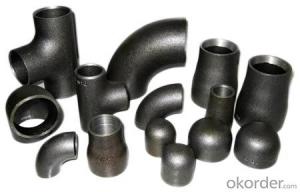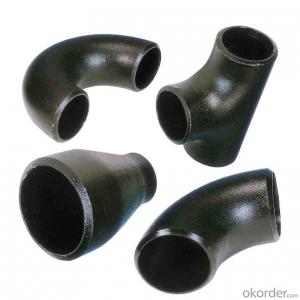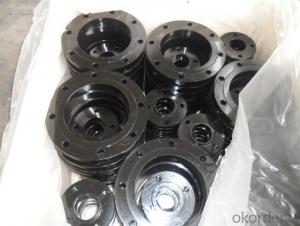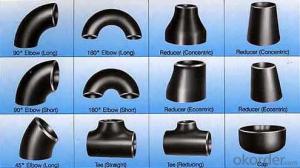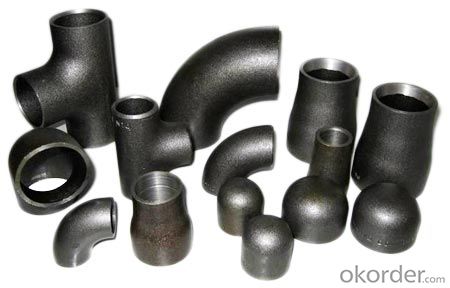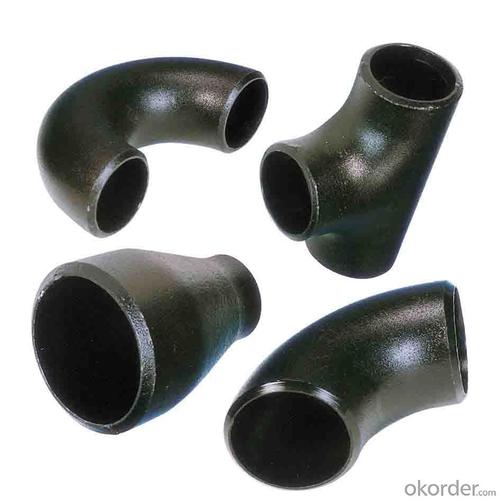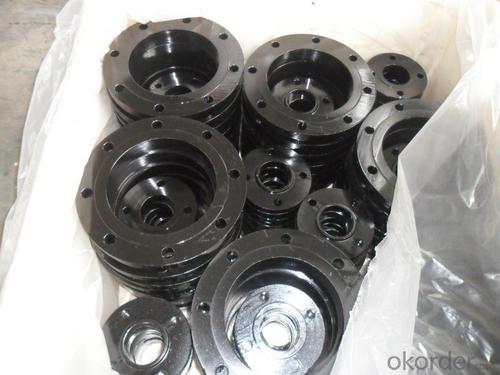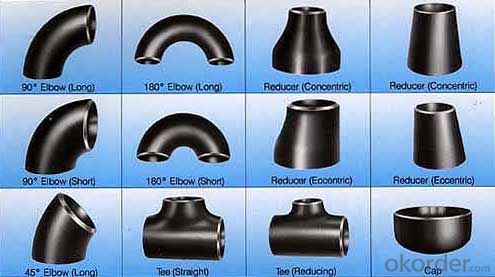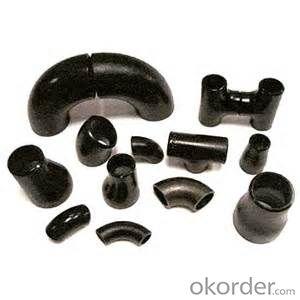CARBON STEEL PIPE FITTINGS ASTM A234 TEE 1''
- Loading Port:
- Tianjin
- Payment Terms:
- TT OR LC
- Min Order Qty:
- 5 m.t.
- Supply Capability:
- 30000 m.t./month
OKorder Service Pledge
OKorder Financial Service
You Might Also Like
Specifications
1.we produce seamless steel pipe
2.size:48-219*4.5-45mm
3.ISO 9000 approved
4.Market:south/east Asia,Mid-east,South America
seamless steel pipe
Material J55 K55 N80 L80 P110.etc
Standard ASTM JIS
Usage conveying oil gas ,oil pipe line,pipe material collar,oil nature gas,
Packing wooden cases or wooden pallet ,export standard package
Others:Special design available according to requirement
Anti-corrosion available and high temperature resistence
Delivery time 30days
Payment term T/T L/C
Name | API oil casing pipe | ||||
Out Diameter | Wall thickness | Material | Thread | Length | |
in | mm | ||||
5 1/2 | 139.7mm | 6.20 | J55/K55/N80 | LTC/STC/BTC | R2 |
6.98 | |||||
7.72 | |||||
9.17 | |||||
10.54 | |||||
6 5/8 | 168.28mm | 7.32 | J55/K55/N80 | LTC/STC/BTC | R2 |
8.94 | |||||
10.59 | |||||
12.06 | |||||
12.06 | |||||
8 5/8 | 219.08 | 8.94 | H40 | S/L/B | 9 5/8R2 |
J55/K55 | S/L/B | ||||
10.6 | L80 | L/B | |||
12.7 | L80 C95 | L/B | |||
14.15 | P110 | L/B | |||
9 5/8 | 244.48 | 13.84 | J55 K55 | R2 | |
15.11 | L80 | L/B | |||
10 3/4 | 273.05 | 11.43 | J55 K55 | S/B/E | R2 |
13.84 | P110 | S/B | |||
15.11 | P110 | S/B | |||
11 3/4 | 298.45 | 12.19 | J55 K55 | S/B | R2 |
10.96 | J55 K55 | S/B | |||
13 3/8 | 339.72 | 12.19 | J55 K55 L80 | S/B | R2 |
10.92 | J55 K55 | S/B | |||
13.06 | L80 | S/B | |||
Coupling and thread can be required according to customer requirment
- Q: How are steel pipes coated for protection against external elements?
- Steel pipes are coated for protection against external elements through various methods, such as hot-dip galvanizing, epoxy coating, or fusion-bonded epoxy coating. These coatings provide a barrier between the steel and the environment, preventing corrosion and extending the lifespan of the pipes.
- Q: How are steel pipes used in the manufacturing of chemical processing equipment?
- Due to their durability, corrosion resistance, and ability to withstand high temperatures and pressures, steel pipes find common use in the manufacturing of chemical processing equipment. These pipes serve two primary functions within the equipment: as conduits for transporting raw materials and as channels for distributing processed products. Firstly, steel pipes safely and efficiently transport raw materials, such as chemicals and solvents, from storage tanks or external sources to various processing units within the equipment. This ensures accurate and controlled dosage and distribution. Steel pipes are chosen for this task due to their strength, which enables them to handle the high pressures and temperatures associated with chemical processing. Secondly, steel pipes distribute processed products throughout the equipment. Once raw materials have undergone chemical reactions and transformations, the resulting products must be transported to the next stage or collected for further processing. Steel pipes are ideal for this purpose as they can withstand the corrosive nature of many chemicals and the high temperatures encountered during these processes. In addition, steel pipes offer versatility and compatibility with various chemicals and solvents, making them well-suited for use in chemical processing equipment. They can be easily customized to accommodate specific requirements, such as different pipe sizes, shapes, and fittings. This flexibility allows for efficient design and installation, ensuring a seamless flow of materials and products throughout the equipment. In conclusion, steel pipes play a crucial role in the manufacturing of chemical processing equipment by providing a reliable and efficient means of transporting raw materials and distributing processed products. Their durability, corrosion resistance, and ability to withstand high temperatures and pressures make them an essential component in ensuring the safe and efficient operation of chemical processing equipment.
- Q: What are the different types of thread connections used in steel pipes?
- There are several types of thread connections commonly used in steel pipes, including tapered threads such as NPT (National Pipe Taper), which are designed to create a tight seal, and straight threads like NPS (National Pipe Straight), which are often used for mechanical applications. Additionally, some other types of thread connections used in steel pipes include BSP (British Standard Pipe), which is widely used in Europe, and API (American Petroleum Institute) threads, which are commonly used in the oil and gas industry.
- Q: Can steel pipes be coated for additional protection?
- Yes, steel pipes can be coated with various materials to provide additional protection against corrosion, abrasion, and other environmental factors. Coatings such as epoxy, polyethylene, and zinc can be applied to enhance the durability and lifespan of steel pipes, making them suitable for diverse applications in different industries.
- Q: How do you prevent corrosion in steel pipes?
- One effective way to prevent corrosion in steel pipes is by applying a protective coating, such as paint or epoxy, to the surface of the pipes. This barrier creates a physical barrier between the pipe and the surrounding environment, preventing moisture and corrosive agents from coming into direct contact with the steel. Additionally, regular inspection and maintenance of the pipes, including cleaning and repairing any damaged coating, can help identify and address potential issues before they lead to corrosion.
- Q: Are steel pipes suitable for transporting fluids?
- Yes, steel pipes are highly suitable for transporting fluids due to their durability, strength, and resistance to corrosion. They can safely and efficiently transport a wide range of fluids, including water, oil, gas, and chemicals, making them a popular choice in various industries such as oil and gas, water supply, and construction.
- Q: What are the advantages of using steel pipes in construction?
- There are several advantages of using steel pipes in construction. Firstly, steel pipes are incredibly strong and durable, providing excellent structural integrity and long-term reliability. They can withstand high pressure and heavy loads, making them suitable for various applications such as water and gas transportation, oil pipelines, and building frameworks. Secondly, steel pipes have a high resistance to corrosion, which ensures longevity and reduces maintenance costs. Additionally, steel pipes are versatile and can be easily customized to meet specific project requirements, as they come in various sizes, shapes, and thicknesses. Lastly, steel pipes are environmentally friendly, as they are recyclable, reducing the overall carbon footprint of construction projects.
- Q: Can steel pipes be used for industrial ventilation systems?
- Yes, steel pipes can be used for industrial ventilation systems. Steel pipes are commonly used in such systems due to their durability, resistance to high temperatures, and ability to handle high airflow volumes. They are also cost-effective and can be easily fabricated to meet specific requirements of an industrial ventilation system.
- Q: How are steel pipes specified in engineering drawings?
- Steel pipes are specified in engineering drawings by providing information such as the diameter, thickness, material grade, length, and any additional specifications or requirements such as the type of coating or threading needed.
- Q: What are the different methods of heat treatment for steel pipes?
- There are several methods of heat treatment for steel pipes, including annealing, normalizing, quenching, tempering, and stress relieving.
Send your message to us
CARBON STEEL PIPE FITTINGS ASTM A234 TEE 1''
- Loading Port:
- Tianjin
- Payment Terms:
- TT OR LC
- Min Order Qty:
- 5 m.t.
- Supply Capability:
- 30000 m.t./month
OKorder Service Pledge
OKorder Financial Service
Similar products
Hot products
Hot Searches
Related keywords
